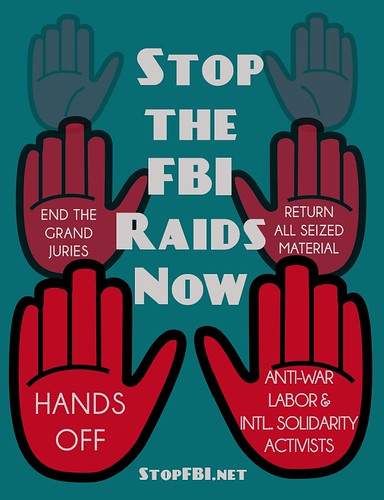The FBI has been intruding in the lives of anti-war, labor and international solidarity activists for months now. by Chris Hutchinson
Today, January 25th, twelve anti-war, labor and international solidarity activists will be expected to appear before a grand jury in Chicago. These activists from Chicago, the Twin Cities in Minnesota, and other areas have been subpoenaed over the past months. Several of the activists had their homes raided. Documents, cell phones, storage disks, computers, and children's artwork were seized from their home. The subpoenas indicated the FBI was looking for evidence that the activists had provided "material support for terrorism." And, recently, it was discovered that the FBI had an informant, who went by the name of "Karen Sullivan," infiltrated an anti-war group in the Twin Cities.
I have personally interviewed many of the activists being targeted and have found no evidence that any of the activists should be facing any FBI investigation. A "witch-hunt" began on September 24th and, since then, U.S. Attorney Patrick Fitzgerald has been working to get activists to testify before a grand jury in Chicago. So far, all the activists have refused to participate in this "fishing expedition," and the grand jury date today means there will be thousands if not tens of thousands of people across the country protesting in actions to support resistance to this "fishing expedition" and denounce an FBI that is using national security laws to intimidate people who seek to use their First Amendment rights.
Over the next few weeks, profiles of each of the activists the FBI is targeting will be published. Each article published will tell the story of one activist and how he or she is being harassed and intimidated for exercising his or her right to organize and speak out against their government and the policies of their government in places like Colombia and Palestine. For more on the targeted activists, click here.
Tom Burke
Tom Burke and his wife were at home with their daughter on September 24th, 2010. They began to receive phone calls from people in Chicago and Minneapolis informing them the FBI was raiding their homes. Burke thought the FBI might be coming to raid his house. He decided his daughter needed to get to kindergarten before the FBI entered his home. He left with his daughter.
The next thing Burke thought to do was write a press release. He took his computer, got in his car to go find a "web cafà �." New to Grand Rapids, MI, he had little idea where to drive to get to a "web cafà �." He took two left turns and noticed a car behind him took two left turns too. It didn't seem right to Burke. He took another left turn and the car behind him also took a left turn too.
Burke decided the FBI was following them. He called his wife and they agreed he should drive to the parking garage at her work. As Burke reached the parking garage, the car that had been following him sped off. An SUV sped into the road right behind him and followed him into the garage. Burke was served with a subpoena to appear before a grand jury. His wife was later served with a subpoena too.
"An agent said you're being investigated for "material support to a terrorist organization' and specifically it said the Revolutionary Armed Forces of Columbia (FARC) and the Popular Front for the Liberation of Palestine (PFLP)," explains Burke. "Myself, I've been the spokesman for the National Committee to Free Ricardo Palmera, where we protested outside the trial in Washington, D.C., of a Colombian revolutionary and one of dozens of FARC leaders who was put on trial. We don't think he should have been put on trial in this country at all. We think they are angry at us for doing political organizing and exercising our right to free speech."
Burke tells the story of Ricardo Palmera saying he was a professor born into a wealthy family in Colombia. He attended the naval academy. In the 1960s, just before graduation, he decided to become a professor. He chose to become a social activist and work to change Colombia so peasants in his country would no longer be violently exploited and oppressed. Soon friends were being tortured.
The following decade "he found that almost all his friends except for one of the founders of a group called Citizen Action, [a woman], were dead," explains Burke. Military and death squads killed them in the 1970s, 1980s, and 1990s. Palmera thought he had a choice between becoming a refugee and joining the Revolutionary Armed Forces of Columbia. He chose to fight and join the struggle as a member of the Patriotic Union.
Palmera was captured by the Colombian government and seized in Ecuador and extradited to the U.S. in 2004. The U.S. put him on trial. The first trial, according to Burke, was a "terrorist trial that led to a hung jury." During the second one, "Federal Judge Hogan was found cheating with a U.S. prosecutor and had to step down."
The jury could not find Palmera guilty of "terrorism," but they did find him guilty of "belonging to the FARC" and so he was charged, mostly because he was found to have been involved in the kidnapping of three U.S. military contractors.
"That charge should have carried only a 7-year maximum sentence, but the judge gave him sixty years," explains Tom. He is now in solitary confinement in a supermax prison in Florence, Colorado, "being held as a political prisoner."
(Note: You can view every article as one long page if you sign up as an Advocate Member, or higher).






